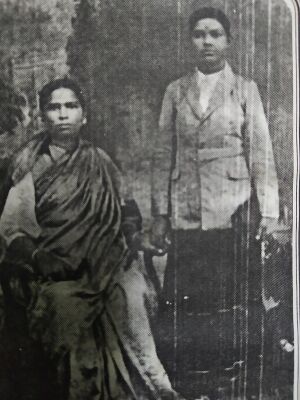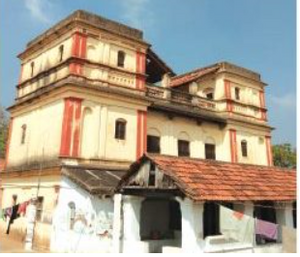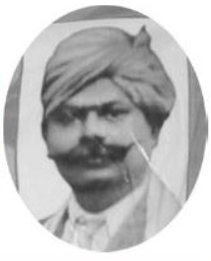K.S.V. Lakshmi Ammal: Difference between revisions
No edit summary |
(Corrected error in line feed character) |
||
| (8 intermediate revisions by 4 users not shown) | |||
| Line 3: | Line 3: | ||
[[File:Jamee3.png|thumb|Marungapuri Zamin Palace]] | [[File:Jamee3.png|thumb|Marungapuri Zamin Palace]] | ||
[[File:Jamee2.png|thumb|Krishna Vijaya Poochaya Nayakkar]] | [[File:Jamee2.png|thumb|Krishna Vijaya Poochaya Nayakkar]] | ||
K.S.V. Lakshmi Ammal was a scholar who wrote | K.S.V. Lakshmi Ammal (1894- 1971) was a scholar who wrote a famous Zamindarini Commentary for ''[[Thirukkural]]'' under the title ''Thirukkural Deepalankaram'', which was published in 1929. | ||
== Personal Life == | == Personal Life == | ||
K.S.V. Lakshmi Ammal was one of the five wives of Krishna Vijaya Poochaya Nayakkar of Marungapuri Zamin near Manapparai in Trichy district. Marungapuri Zamin | K.S.V. Lakshmi Ammal was one of the five wives of Krishna Vijaya Poochaya Nayakkar of Marungapuri Zamin near Manapparai in Trichy district. Marungapuri Zamin was spread out over 24 km and the zamindar ruled over 322 villages and 14 temples. They were known as the Pulikuthi Nayakkar family. The other four wives of Krishna Vijaya Poochaya Nayakkar were Rukmini, Muthalagu, Vellaiyamma, and Ponnalaku. | ||
Born in 1894, Lakshmi Ammal was the fifth queen of the Marungapuri Zamin. She had a daughter named Andal. The eldest wife, Ponnalagu’s daughter was Neelambal. The other wives did not have children. Lakshmi Ammal adopted her daughter’s son Sivasanmuga Poochaiya Nayakkar as her heir while Ponnalagu Ammal adopted her own daughter's son Kumara Vijaya Nayakkar as hers. After the abolishment of the Zamindari system, the temple management rights and possessions were shared by both heirs. Lakshmi Ammal died in 1971. | Born in 1894, Lakshmi Ammal was the fifth queen of the Marungapuri Zamin. She had a daughter named Andal. The eldest wife, Ponnalagu’s daughter was Neelambal. The other wives did not have children. Lakshmi Ammal adopted her daughter’s son Sivasanmuga Poochaiya Nayakkar as her heir while Ponnalagu Ammal adopted her own daughter's son Kumara Vijaya Nayakkar as hers. After the abolishment of the Zamindari system, the temple management rights and possessions were shared by both heirs. Lakshmi Ammal died in 1971. | ||
== Literary Work == | == Literary Work == | ||
K.S.V. Lakshmi Ammal wrote a commentary to '' | K.S.V. Lakshmi Ammal wrote a commentary to ''Thirukkural'' titled ''Thirukkural Deepalankaram''. Lakshmi Ammal mentions that [[M.R. Arunachala Kavirayar]]'s commentary for ''Thirukkural'' was the only one available in prose. However, since it was written in a complex language, she decided to write her own in a simpler style. | ||
== Social Work == | == Social Work == | ||
K.S.V. Lakshmi Ammal was a nominated member of the Trichy District Board and the President of the | K.S.V. Lakshmi Ammal was a nominated member of the Trichy District Board and the President of the district level ''Bharathi Sahothara Sangam'' . | ||
== | == Place in literature == | ||
K.S.V. Lakshmi Ammal's commentary approaches Thirukkural from the Hindu philosophical tradition. Later day myths about Thiruvalluvar are mentioned in the book under the title of ''Thiruvalluvanayanar Puranam''. | |||
On the heels of the Tamil publishing movement which published ancient Tamil books in print (which were available until then only as palm-leaf manuscripts), came the movement to interpret ancient Tamil texts with modern literary and historical devices. This was called the 'commentary movement'. Lakshmi Ammal was one of few women who were part of this movement. | |||
== References == | == References == | ||
* [https://ntrichy.com/2020/06/27/she-was-the-first-woman-to-write-a-commentary-on-thirukkural-91-years-ago/ 91 ஆண்டுகளுக்கு முன்பு திருக்குறளுக்கு தெளிவுரை எழுதிய முதல் பெண்மணி - ntrichy.com] | * [https://ntrichy.com/2020/06/27/she-was-the-first-woman-to-write-a-commentary-on-thirukkural-91-years-ago/ 91 ஆண்டுகளுக்கு முன்பு திருக்குறளுக்கு தெளிவுரை எழுதிய முதல் பெண்மணி - ntrichy.com] | ||
*[https://www.tamildigitallibrary.in/admin/assets/book/TVA_BOK_0007993_%E0%AE%A4%E0%AE%BF%E0%AE%B0%E0%AF%81%E0%AE%95%E0%AF%8D%E0%AE%95%E0%AF%81%E0%AE%B1%E0%AE%B3%E0%AF%8D_%E0%AE%A4%E0%AF%80%E0%AE%AA%E0%AE%B2%E0%AE%BE%E0%AE%99%E0%AF%8D%E0%AE%95%E0%AE%BE%E0%AE%B0%E0%AE%AE%E0%AF%8D.pdf | *[https://www.tamildigitallibrary.in/admin/assets/book/TVA_BOK_0007993_%E0%AE%A4%E0%AE%BF%E0%AE%B0%E0%AF%81%E0%AE%95%E0%AF%8D%E0%AE%95%E0%AF%81%E0%AE%B1%E0%AE%B3%E0%AF%8D_%E0%AE%A4%E0%AF%80%E0%AE%AA%E0%AE%B2%E0%AE%BE%E0%AE%99%E0%AF%8D%E0%AE%95%E0%AE%BE%E0%AE%B0%E0%AE%AE%E0%AF%8D.pdf Thirukkural Depalangaram Internet archives] | ||
{{Finalised-en}} | |||
[[Category:English Content]] | [[Category:English Content]] | ||
Latest revision as of 20:07, 12 July 2023
இந்தப் பக்கத்தை தமிழில் வாசிக்க: கி.சு.வி.இலட்சுமி அம்மாள்
K.S.V. Lakshmi Ammal (1894- 1971) was a scholar who wrote a famous Zamindarini Commentary for Thirukkural under the title Thirukkural Deepalankaram, which was published in 1929.
Personal Life
K.S.V. Lakshmi Ammal was one of the five wives of Krishna Vijaya Poochaya Nayakkar of Marungapuri Zamin near Manapparai in Trichy district. Marungapuri Zamin was spread out over 24 km and the zamindar ruled over 322 villages and 14 temples. They were known as the Pulikuthi Nayakkar family. The other four wives of Krishna Vijaya Poochaya Nayakkar were Rukmini, Muthalagu, Vellaiyamma, and Ponnalaku.
Born in 1894, Lakshmi Ammal was the fifth queen of the Marungapuri Zamin. She had a daughter named Andal. The eldest wife, Ponnalagu’s daughter was Neelambal. The other wives did not have children. Lakshmi Ammal adopted her daughter’s son Sivasanmuga Poochaiya Nayakkar as her heir while Ponnalagu Ammal adopted her own daughter's son Kumara Vijaya Nayakkar as hers. After the abolishment of the Zamindari system, the temple management rights and possessions were shared by both heirs. Lakshmi Ammal died in 1971.
Literary Work
K.S.V. Lakshmi Ammal wrote a commentary to Thirukkural titled Thirukkural Deepalankaram. Lakshmi Ammal mentions that M.R. Arunachala Kavirayar's commentary for Thirukkural was the only one available in prose. However, since it was written in a complex language, she decided to write her own in a simpler style.
Social Work
K.S.V. Lakshmi Ammal was a nominated member of the Trichy District Board and the President of the district level Bharathi Sahothara Sangam .
Place in literature
K.S.V. Lakshmi Ammal's commentary approaches Thirukkural from the Hindu philosophical tradition. Later day myths about Thiruvalluvar are mentioned in the book under the title of Thiruvalluvanayanar Puranam.
On the heels of the Tamil publishing movement which published ancient Tamil books in print (which were available until then only as palm-leaf manuscripts), came the movement to interpret ancient Tamil texts with modern literary and historical devices. This was called the 'commentary movement'. Lakshmi Ammal was one of few women who were part of this movement.
References
- 91 ஆண்டுகளுக்கு முன்பு திருக்குறளுக்கு தெளிவுரை எழுதிய முதல் பெண்மணி - ntrichy.com
- Thirukkural Depalangaram Internet archives
✅Finalised Page



